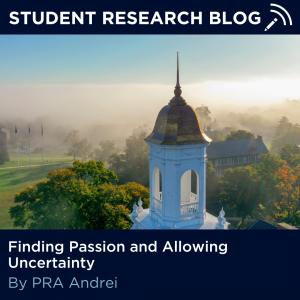By Andrei Abarientos, Peer Research Ambassador
 I’ll be the first to admit I’m still figuring things out: in my research, in my career, in my life. When people ask what I want to do with myself after college, I jokingly say: “maybe research, maybe medicine, maybe some secret third option.” The truth is, that secret third option is literally anything else. Sometimes, I think I could teach, others I think I could go into science policy or public health. Sometimes (especially around exam season) I think about dropping out, running away and living in the mountains.
I’ll be the first to admit I’m still figuring things out: in my research, in my career, in my life. When people ask what I want to do with myself after college, I jokingly say: “maybe research, maybe medicine, maybe some secret third option.” The truth is, that secret third option is literally anything else. Sometimes, I think I could teach, others I think I could go into science policy or public health. Sometimes (especially around exam season) I think about dropping out, running away and living in the mountains.
I spent a long time thinking that maybe my personality was incompatible with research. I’m someone whose interests are still so broad, but much of research is narrow by design: you spend your time working on a specific social phenomenon, a specific protein, a specific disease. I was just interested in too much, I thought. Still, I jumped in, maybe for the wrong reasons; it seemed like everyone was doing research, and I wanted to give it a shot.
I began working with my lab looking at vaccines against tickborne viruses in my freshman year, before I really understood much of anything. I joined because I was interested in vaccines, partially because of the pandemic but to a larger extent because of The Last of Us, World War Z, and other zombie entertainment I pored through as a kid. I knew more about The Walking Dead at that point than I really knew about virology or infectious diseases, and certainly more than I knew about working in a lab.
Even still, I quickly found myself captivated by science, not just as “something everyone was doing” but as something that I felt incredibly fulfilled by. I loved (and still love) working on the bench doing experiments or reading new papers as they come out. I grew a love-hate relationship with the diseases we were working with that were both clinically damaging and scientifically fascinating.
This research had the unintended effect of making me super interested in bugs like ticks or mosquitoes. I wanted something a bit different from UConn and a bit different from virology; I was lucky enough to get an internship with the National Institutes of Health in Montana looking at tick physiology. There, I got to not only do research that was exciting and new but also the chance to run away out West and play cowboy for a few months.
My research interests are still broad but have focused now on insect-borne diseases. To be clear, those interests aren’t related to any innate personality trait. They’re much more a result of chance and luck. I found a lab knowing very little and happened to fall in love with it. I went to my next lab because I thought ticks were cool and found a whole new world of science. Outside of the lab, my career interests are still murky, but are being continually formed by my research, my classes, and my extracurriculars. I’ve begun to understand that building interests and set passions is a cumulative and changing process. I’d love to have come out of pre-K knowing exactly what I’d want to do, but I also think that this way of discernment is much more fun.
I write about myself because it’s easy to feel like you have to make all the decisions and have all the answers now. I’m here to tell you, as someone who has spent far more time thinking about these decisions than making them: you have time, and it’s okay to be unsure. That’s key in research, too, I’ve realized. The pure act of discovering new things, in and of itself, requires a certain humility and comfort with feeling lost. My role models for research (and for life) are the people who get excited instead of beaten down when there’s no clear answers.
The important thing is being proactively unsure, stumbling your way forward as opposed to stumbling around. And as a college student, you have plenty of opportunities at your disposal to stumble, from research you hadn’t thought about to new clubs that seem cool to classes that you’re worried “aren’t relevant enough”. The best thing to do is to start exploring them.
Andrei is a junior majoring in Pathobiology. Click here to learn more about Andrei.